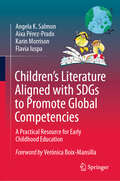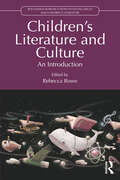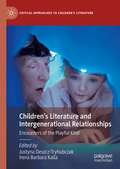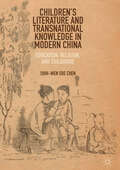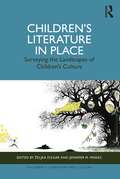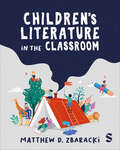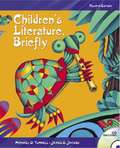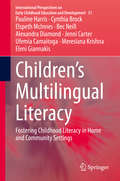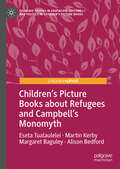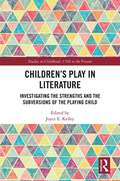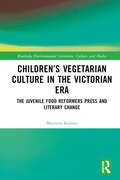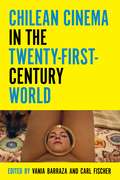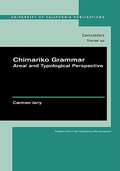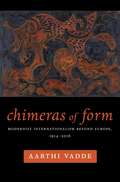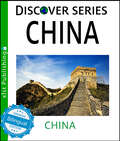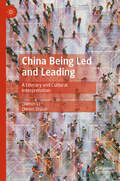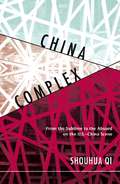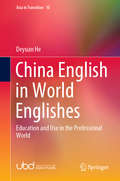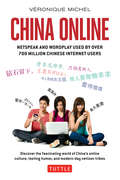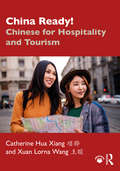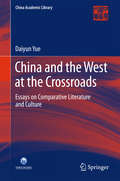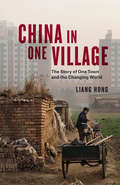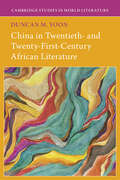- Table View
- List View
Children’s Literature Aligned with SDGs to Promote Global Competencies: A Practical Resource for Early Childhood Education
by Karin Morrison Angela K. Salmon Aixa Pérez-Prado Flavia IuspaThis book presents children’s literature as a platform for learning and helping young readers develop the knowledge, skills, and attitudes needed to thrive in an interconnected and diverse global society. It draws from various theoretical frameworks and research findings to implement critical literacy and culturally responsive teaching in the meaning-making process.The book focuses on global competencies and Sustainable Development Goals (SDGs) as intertwined concepts that work together to foster a more sustainable, inclusive, and equitable world. Developing global competencies empowers children and communities to actively participate in achieving the SDGs and addressing the pressing challenges of our time. The authors set high expectations on children as actors in transforming society. To facilitate this, the book offers an overview of child development theories as a foundation for designing developmentally appropriate practices to extend children’s books toward deep thinking and understanding. The book includes sample lessons that use cutting-edge research-based pedagogies and tools such as visible thinking routines and other approaches. Those lessons also help readers identify the Habits of Mind (HOM) children can develop by listening to and discussing stories. The HOM are attributes of good problem-finders and problem-solvers needed when confronting complex issues. The book provides resources and sample lessons that implement different thinking strategies to engage children in questioning and analyzing what they read, making them more critical. This is how children deeply understand the world and their role in creating positive change. The book aims to cultivate change-makers and global citizens through stories. It offers innovative approaches, including online learning options in accessible and engaging ways to help children think globally and act locally‘Through the power of children’s literature, this book serves a larger agenda: To build a more thoughtful world for future generations. By caring for and learning from one another through suggested activities in this book, they will share the riches and resources from across the world. As children learn about the promise of actions toward the UN Sustainable Goals, they can imagine living in an interdependent learning community where all people continually searching for ways to trust each other, learn together, and grow toward greater intelligence.’ Arthur Costa and Bena Kallick, Co-Founders and Directors of The Institute for Habits of Mind
Children’s Literature and Culture: An Introduction (Routledge Introductions to Young Adult and Children's Literature)
by Rebecca RoweChildren’s Literature and Culture: An Introduction guides readers in the study of culture in, around, and through children’s literature. Children’s literature has long been used as a mechanism by which a culture passes its values from one generation to the next. Because of this culturally didactic purpose, children’s literature can be viewed as one of the most fruitful areas of study of any given culture. At the same time, studying the cultures from which works of children’s literature emerge and in which they circulate can also help better understand not only the ideas of childhood that underpin individual texts for children but the role they play in the construction and transmission of different cultural ideologies. This book teaches readers this double work of using culture to understand children’s literature and vice versa. This volume traces the scholarly methodologies and histories that have attended the study of each of the 20 chapters’ given subject—from the representation of race in and around children’s literature to questions of censorship to how libraries can and do shape children’s literature. In the process, it prepares readers to confidently enter and forward scholarly debates and to teach such debates to their own students.
Children’s Literature and Intergenerational Relationships: Encounters of the Playful Kind (Critical Approaches to Children's Literature)
by Justyna Deszcz-Tryhubczak Irena Barbara KallaChildren’s Literature and Intergenerational Relationships: Encounters of the Playful Kind explores ways in which children’s literature becomes the object and catalyst of play that brings younger and older generations closer to one another. Providing examples from diverse cultural and historical contexts, this collection argues that children’s texts promote intergenerational play through the use of literary devices and graphic formats and that they may prompt joint play practices in the real world. The book offers a distinctive contribution to children’s literature scholarship by shifting critical attention away from the difference and conflict between children and adults to the exploration of inter-age interdependencies as equally crucial aspects of human life, presenting a new perspective for all who research and work with children’s culture in times of global aging.
Children’s Literature and Transnational Knowledge in Modern China: Education, Religion, and Childhood
by Shih-Wen Sue ChenThis book examines the development of Chinese children’s literature from the late Qing to early Republican era. It highlights the transnational flows of knowledge, texts, and cultures during a time when children’s literature in China and the West was developing rapidly. Drawing from a rich archive of periodicals, novels, tracts, primers, and textbooks, the author analyzes how Chinese children’s literature published by Protestant missionaries and Chinese educators in the late nineteenth and early twentieth centuries presented varying notions of childhood. In this period of dramatic transition from the dynastic Qing empire to the new Republican China, young readers were offered different models of childhood, some of which challenged dominant Confucian ideas of what it meant to be a child. This volume sheds new light on a little-explored aspect of Chinese literary history. Through its contributions to the fields of children’s literature, book history, missionary history, and translation studies, it enhances our understanding of the negotiations between Chinese and Western cultures that shaped the publication and reception of Chinese texts for children.
Children’s Literature in Place: Surveying the Landscapes of Children’s Culture (Children's Literature and Culture)
by Jennifer M. Miskec Željka FlegarChildren’s Literature in Place: Surveying the Landscapes of Children’s Culture is an edited collection dedicated to individual, international, and interdisciplinary considerations of the places and spaces of children’s literature, media, and culture, from content to methodology, in fictional, virtual, and material settings. This volume proposes a survey of the changing landscapes of children’s culture, the expected and unexpected spaces and places that emerge as and because of children’s culture. The places and spaces of children’s literature are varied and diverse. By making place studies a guiding principle, this book builds on the impressive body of international research on place in children’s literature, media, and culture to bring together and provide a comprehensive overview of how to study place in children’s and young adult literature. This volume provides a wide range of approaches and international perspectives of place in children’s literature, media, and culture and contributes to this growing and relevant field by showcasing various scholarly aspects and approaches to children’s literature, and the place of children’s literature in the context of international scholarship.
Children’s Literature in the Classroom
by Matthew D. ZbarackiChildren′s literature is a powerful resource that can inspire a young reader’s lifetime love of reading, but how can you ensure that your literacy teaching uses this rich creative world to its fullest? This book gives pre-service primary teachers an in-depth guide to each major type of children′s book, examining the form, structure and approach of each. From fairy tales and non-fiction to picture books and digital texts, learn what qualities underpin outstanding children′s literature and how you can use this to inspire rewarding learning experiences in your classroom. Key features: Each chapter is full of key book recommendations to help you select excellent age-appropriate texts for your learners An international focus across English-language publishing, covering key books from Australian, US and UK authors A special focus on Australian indigenous children′s literature Busting popular myths about children′s literature to give you a deeper understanding of the form Evaluation criteria for every genre, helping you to recognise the qualities of high quality books This is essential reading for anyone training to teach in primary schools and qualified teachers looking to improve their professional knowledge. Matthew Zbaracki is State Head of Victoria in the National School of Education at ACU, Melbourne.
Children’s Literature in the Classroom
by Matthew D. ZbarackiChildren′s literature is a powerful resource that can inspire a young reader’s lifetime love of reading, but how can you ensure that your literacy teaching uses this rich creative world to its fullest? This book gives pre-service primary teachers an in-depth guide to each major type of children′s book, examining the form, structure and approach of each. From fairy tales and non-fiction to picture books and digital texts, learn what qualities underpin outstanding children′s literature and how you can use this to inspire rewarding learning experiences in your classroom. Key features: Each chapter is full of key book recommendations to help you select excellent age-appropriate texts for your learners An international focus across English-language publishing, covering key books from Australian, US and UK authors A special focus on Australian indigenous children′s literature Busting popular myths about children′s literature to give you a deeper understanding of the form Evaluation criteria for every genre, helping you to recognise the qualities of high quality books This is essential reading for anyone training to teach in primary schools and qualified teachers looking to improve their professional knowledge. Matthew Zbaracki is State Head of Victoria in the National School of Education at ACU, Melbourne.
Children’s Literature, Briefly (4th edition)
by Michael O. Tunnell James S. JacobsAre you looking for a brief introduction to children's literature genres that leaves time to read actual works of children's literature? This new, significantly revised and streamlined edition of Children's Literature, Briefly introduces the reader to the essential foundations of each children's literature genre, supported by practical features and tools to suggest quality books and activities to advance literacy in the classroom. As new teachers build their classroom library, the brevity of this affordable new edition ensures readers have the resources to purchase and time to read actual children's literature. The goal of this text, then, is to provide a practical overview of children's books, offering a framework and background information while keeping the spotlight on the books themselves.
Children’s Multilingual Literacy: Fostering Childhood Literacy in Home and Community Settings (International Perspectives on Early Childhood Education and Development #31)
by Pauline Harris Cynthia Brock Elspeth McInnes Bec Neill Alexandra Diamond Jenni Carter Ufemia Camaitoga Meresiana Krishna Eleni GiannakisThis book offers a comprehensive report on a three-year, cross-cultural, critical participatory action research study, conducted in children’s homes and communities in Fiji. This project contributed to building sustainable local capacity in communities without access to early childhood services, so as to promote preschool children’s literacy development in their home languages and English. The book includes rich descriptions of the young children’s lived, multilingual literacy practices in their home and community contexts. This work advances research-based practices for fostering young children’s multilingual literacy and building community capacity in a post-colonial Pasifika context; further, it shares valuable insights into processes and complexities that are inherent to multiliteracy and cross-cultural research.
Children’s Picture Books about Refugees and Campbell’s Monomyth (Palgrave Studies in Education, Culture, and Politics in Children’s Picture Books)
by Margaret Baguley Martin Kerby Alison Bedford Eseta TualauleleiThis book explores the portrayal of refugee experiences in children&’s picture books using insights from Joseph Campbell&’s The Hero with a Thousand Faces. Chapter 1 considers this emerging genre of children&’s literature within its social and educational context and explains how the narratives embedded within these books were examined. Chapter 2 cites key studies in the field of children&’s picture books about refugees to uncover common narrative arcs, characterisations, themes and educative value. Remaining chapters detail the three core elements of Campbell's canonical narrative arc to review how the experience of refugees is presented in modern picture books using this familiar narrative structure as a means of exploring a humanitarian issue with overt political overtones. In so doing, the authors employ an innovative means of analysing picture books that deal with refugees by positioning them within a familiar narrative arc that belies the fear of difference they may otherwise represent.
Children’s Play in Literature: Investigating the Strengths and the Subversions of the Playing Child (Studies in Childhood, 1700 to the Present)
by Joyce E. KelleyWhile we owe much to twentieth and twenty-first century researchers’ careful studies of children’s linguistic and dramatic play, authors of literature, especially children’s literature, have matched and even anticipated these researchers in revealing play’s power—authors well aware of the way children use play to experiment with their position in the world. This volume explores the work of authors of literature as well as film, both those who write for children and those who use children as their central characters, who explore the empowering and subversive potentials of children at play. Play gives children imaginative agency over limited lives and allows for experimentation with established social roles; play’s disruptive potential also may prove dangerous not only for children but for the society that restricts them.
Children’s Vegetarian Culture in the Victorian Era: The Juvenile Food Reformers Press and Literary Change (Routledge Environmental Literature, Culture and Media)
by Marzena KubiszThis book fills a unique gap in the research on the cultural history of vegetarianism and veganism, children's literature and Victorian periodicals, and it is the first publication to systematically describe the phenomenon of Victorian children’s vegetarianism and its representations in literature and culture.Situated in the broad socio-literary context spanning the late nineteenth century and early twentieth century, the book lays the groundwork for contemporary children’s vegan literature and argues that present ethical and environmental concerns can be traced back to the Victorian period. Following the current turn in contemporary research on children, their experience and their voices, the author examines children’s vegetarian culture through the prism of the periodicals aimed directly at them. It analyses how vegetarian principles were communicated to children and listens to the voices of children who were vegetarians, and who tested their newly formed identity in the pages of three magazines published between 1893 and 1914: The Daisy Basket, The Children’s Garden and The Children’s Realm. This book will appeal to the growing body of researchers interested in the social, cultural and literary aspects of vegetarianism and veganism, human–animal relations, childhood studies, children’s literature, periodical studies and Victorian studies.
Chilean Cinema in the Twenty-First-Century World (Contemporary Approaches to Film and Media Series)
by Carl Fischer María Helena Rueda María Paz Peirano Carolina Urrutia Neno Camilo Trumper Paola Lagos Labbé Jonathan Risner Moisés Park María Angélica Franken Arturo Márquez-Gómez Vania Barraza Mónica Ramón Ramón Ríos Claudia Bossay María Constanza Vergara ReyesFocusing on films from Chile since 2000 and bringing together scholars from South and North America, Chilean Cinema in the Twenty-First-Century World is the first English-language book since the 1970s to explore this small, yet significant, Latin American cinema. The volume questions the concept of "national cinemas" by examining how Chilean film dialogues with trends in genre-based, political, and art-house cinema around the world, while remaining true to local identities. Contributors place current Chilean cinema in a historical context and expand the debate concerning the artistic representation of recent political and economic transformations in contemporary Chile. Chilean Cinema in the Twenty-First-Century World opens up points of comparison between Chile and the ways in which other national cinemas are negotiating their place on the world stage. The book is divided into five parts. "Mapping Theories of Chilean Cinema in the World" examines Chilean filmmakers at international film festivals, and political and affective shifts in the contemporary Chilean documentary. "On the Margins of Hollywood: Chilean Genre Flicks" explores on the emergence of Chilean horror cinema and the performance of martial arts in Chilean films. "Other Texts and Other Lands: Intermediality and Adaptation Beyond Chile(an Cinema)" covers the intermedial transfer from Chilean literature to transnational film and from music video to film. "Migrations of Gender and Genre" contrasts films depicting transgender people in Chile and beyond. "Politicized Intimacies, Transnational Affects: Debating (Post)memory and History" analyzes representations of Chile’s traumatic past in contemporary documentary and approaches mourning as a politicized act in postdictatorship cultural production. Intended for scholars, students, and researchers of film and Latin American studies, Chilean Cinema in the Twenty-First-Century World evaluates an active and emergent film movement that has yet to receive sufficient attention in global cinema studies.
Chimariko Grammar: Areal and Typological Perspective
by Carmen JanyThe Chimariko language, now extinct, was spoken in Trinity County, California. This reference grammar, based on data collected by Harrington in the 1920's, represents the most comprehensive description of the language. Written from a functional-typological perspective this work also examines language contact in Northern California showing that grammatical traits are often shared among genetically unrelated languages in geographically contiguous areas.
Chimeras of Form: Modernist Internationalism Beyond Europe, 1914–2016 (Modernist Latitudes)
by Aarthi VaddeIn the years following World War I, the “international” emerged as a distinct scale of political and cultural focus. Internationalisms proliferated in kind as writers and thinkers sought to imagine modes of cooperation that would balance transnational solidarities with national sovereignty. While so-called political realists across the twentieth century have regarded such attempts as wishful thinking, Aarthi Vadde argues that the negotiation of wishing and thinking is at the very heart of internationalism. In Chimeras of Form, she shows why modernist literary form is essential to understanding the aspirational and analytical force of internationalism in and beyond Europe.Major writers such as Rabindranath Tagore, James Joyce, Claude McKay, George Lamming, Michael Ondaatje, and Zadie Smith use modernist strategies to reshape how readers think about the cohesion and interrelation of political communities in the wake of empire. Vadde lucidly explains how their formal experiments with the novel, short story, poetry, and political essay contribute to and sometimes even anticipate debates in postcolonial theory and cosmopolitanism. She reads Joyce’s use of asymmetrical narratives as a way to ask questions about international camaraderie, and demonstrates how the “plotless” works of McKay and Lamming upturn ideas of citizenship and diasporic alienation. Her analysis of twenty-first-century writers Smith and Shailja Patel shows how ongoing conflicts around migration, displacement, and global economic inequality link modernist, postcolonial, and contemporary traditions of literature. Vadde brings these traditions together to reveal the dual nature of internationalism as an ambition, possibly a chimeric one, and an actual political discourse vital to understanding our present moment.
China (Xist Kids Bilingual Spanish English)
by Xist PublishingBilingual Books for Babies & Toddlers Become a world explorer! This Discover Series picture book brings the world to your door. Introduce your child to the beautiful art and architecture of China. Each of the 23 photos in this book are crisp and clear with a simple title beneath the image. Used as a jumpstart for interaction, Discover Series Picture Books are a great way to introduce new images, words and ideas to babies and toddlers. Bilingual Discover Series books feature both English and Spanish words to introduce language learners to new vocabulary. Each page features a professionally photographed object with a simple title beneath it. Libros bilingües para bebés y niños pequeños ¡Conviértase en un explorador mundial! Este libro de imágenes Discover Series trae el mundo a tu puerta. Presente a su hijo al hermoso arte y arquitectura de China. Cada una de las 23 fotos de este libro son nítidas y claras con un título simple debajo de la imagen. Utilizado como un salto para la interacción, Discover Series Picture Books son una gran manera de introducir nuevas imágenes, palabras e ideas a los bebés y niños pequeños. Los libros bilingües de Discover Series cuentan con palabras tanto en inglés como en español para introducir a los aprendices de idiomas en un nuevo vocabulario. Cada página presenta un objeto fotografiado profesionalmente con un título simple debajo de él.
China Being Led and Leading: A Literary and Cultural Interpretation
by Daniel Braun Zhimin LiThis book unearths a forgotten history of exchange and enlightenment between China and the West, told through vivid examples drawn from the world of poetry, the philosophy of culture and religion, and the realm of international communication. Across chapters that cover an extraordinary range of cultural terrain, from an examination of the parallel expatriate experiences of the British critic and poet William Empson and the Chinese writer Xu Zhimo, to a study of the influence of Christian thought on the evolution of Confucianism, authors Li Zhimin and Daniel Braun rethink the contemporary paradigm of western hegemony and international division that shapes our senses and studies of the East and the West alike, in order to present an image of modern China that is richly hybrid in its blend of cultures, histories, and traditions. This book is immersed in the cultures and literary traditions of China and the West, and written for specialists of the regions and general interest readers alike.
China Complex
by Shouhua QiFor more than a century, the United States and China have been partners in an occasionally graceful--but often awkward--cultural-political tango. In this insightful narrative, Shouhua Qi, part of a new generation of scholars whose life experiences in China and the West serve as the basis for an acute analysis of cross-cultural perceptions, weaves literary and cultural criticism together with journeys across time, politics, and popular culture. Part memoir, Qi reveals the China complex as a manifestation of the search for meaning at many levels: personal, national, and global. With the future of the U.S. and China so intertwined now more than ever before, Qi's cogent assessment of the interpersonal foundations of the US-China relationship in the twenty-first century is a must-read.
China English in World Englishes: Education and Use in the Professional World (Asia in Transition #10)
by Deyuan HeThis book fills the gap in World Englishes studies in terms of the pedagogic implication of China English and its use in the Chinese workplace. Using three triangulated methods, namely, questionnaire survey, matched-guise technique, and focused interview, the book adopts an innovative research methodology that combines quantitative and qualitative data from 3,493 participants. Overall, the participants still believe that the standardized Englishes are desirable models of English in China and that China English should be well codified and promoted before being adopted as the pedagogic model. In addition, the book proposes that the curriculum design of university English should include an introduction to the well-defined characteristics of China English and world Englishes. Last but not least, the book reveals that English is being used more widely and frequently in the professional world than before and has become increasingly important in China.
China Online
by Véronique Michel Sebastien Koval Claude Muller Marcio LoboDive into China's cool new web-based subculture with China Online!Using Baidu, China's form of Google, young Chinese web-surfers are creating their own language on the Internet. With this book, you can get an insider's view of the way the new wave of Chinese youth communicates in code. Author and translator Véronique Michel guides you on a tour of the lifestyles inhabiting modern-day "tribes" on the Internet: The "Moonlight" or "Starlight" TribeThe "Ant" TribeThe "Corporate Insects"The "Diamond Man"China Online describes a youth culture in transition-using humor and creativity to survive in a hugely competitive environment. They enjoy pun-including the ingenious "talking numbers" used to say more things with fewer keystrokes and characters. There is a great deal that lies under the surface. Learn the secret netspeak used by over half a billion of the coolest people in China, and be in the know!
China Ready!: Chinese for Hospitality and Tourism
by Catherine Hua Xiang Xuan Lorna WangChina Ready! prepares students and independent learners to work in the hospitality and tourism industry for high-value tourism business coming from China to English-speaking countries. The book focuses on listening and speaking skills – essential skills for learners. This book’s features include the following: • Important cultural and social awareness factors for interacting with clients from China • Vocabulary • Real-life scenarios • Situational role playing and interactive listening • Experiential exercises to encourage learning outside the classroom The book is aimed at students who have attained the Common European Framework Reference (CEFR) A2 level and will bring them up to the CEFR B2/C1 level or 汉语水平 考试 (HSK) 4/5.
China and the Victorian Imagination
by Ross G. FormanToday, the 'rise' of China is omnipresent: whether articulated as opportunity or threat, expected or surprising, China's global prominence is consistently proclaimed as new and noteworthy. Yet the Victorians held similar beliefs that China was rising in importance, and that its rise was integrally tied to the success of the West. This book traces the development of this perception of China and the Chinese from the Opium Wars to the 1911 demise of the Qing dynasty. It surveys an array of literary and cultural materials, from short stories produced by British expatriates in China and distributed locally to representations of the Chinese on the British stage, from the sensational fiction surrounding the Chinese community in London's East End to turn-of-the-century invasion novels with their 'Yellow Peril' villains. Ross Forman demonstrates that China, as much as India, occupied the Victorian imagination; in so doing, he reassesses British imperialism in Asia.
China and the West at the Crossroads: Essays on Comparative Literature and Culture (China Academic Library)
by Daiyun YueBeginning with a retrospective of the past century, this book offers a panoramic picture of Chinese comparative literature, from its nascence in the early 1920s, through its evolution in the 1980s, to the new development at the turn of the century, ending with a prospective look at the future of comparative literature in the 21st century. The articles presented here reveal the author's deep understandings of the literature and culture of her own country and those of other countries. A rich array of case studies and in-depth theorizing make it an extremely interesting and enlightening read. Prof. Daiyun Yue is a prominent professor at Peking University and a leading figure in Chinese comparative literature. She has served as Head of the Institute for Comparative Literature and Cultural Studies, PKU (1984--1998) and the third president of the Chinese Comparative Literature Association (1989--2014). Further, she is the founder of Dialogue Transculturel, a much-acclaimed journal of comparative literature. Prof. Yue approaches outstanding literature as a bridge to link people of different cultural traditions: "The reason why interdisciplinary literary research between two alien cultures is possible is because dialog between alien cultures, along with exchange and understanding, is more readily realized through literature. " Herein lies the value of comparative literature.
China in One Village: The Story of One Town and the Changing World
by Liang HongA global future in the history of a single villageAfter a decade away from her ancestral family village, during which she became a writer and literary scholar in Beijing, Liang Hong started visiting her rural hometown in landlocked Henan Province. What she found was an extended family riven by the seismic changes in Chinese society and a village turned inside out by emigration, neglect, and environmental despoliation. Combining family memoir, literary observation, and social commentary, Liang&’s by turns lyrically poetic and movingly raw investigation into the fate of her village became a bestselling book in China and brought her fame. For many months, Liang walked the roads and fields of her village, recording the stories of her relatives—especially her irascible, unforgettable father—and talking to everyone from high government officials to the lowest of village outcasts. Across China, many saw in Liang&’s riveting interviews with family members and childhood acquaintances a mirror of their own lives, and her observations about the way the greatest rural-to-urban migration of modern times has twisted the country resonated deeply. China in One Village tells the story of contemporary China through one clear-eyed, literary observer, one family, and one village.
China in Twentieth- and Twenty-First-Century African Literature (Cambridge Studies in World Literature)
by Duncan M. YoonChina in Twentieth- and Twenty-First Century African Literature unpacks the long-standing complexity of exchanges between Africans and Chinese as far back as the Cold War and beyond. This scope encompasses how China, which emerged as a main engine of the world economy by the end of the twentieth century, has transformed patterns of globalization across the continent. In this ground-breaking work on cultural representations, Duncan M. Yoon examines the controversial symbol of China in African literature. He reads acclaimed authors like Kofi Awoonor, Henri Lopes, and Bessie Head, as well as contemporary writers, including Ufrieda Ho, Kwei Quartey, and Yvonne Adhiambo Owuor. Each chapter focuses on a genre such as poetry, detective fiction, memoir, and the novel, drawing out themes like resource extraction, diaspora, gender, and race. Yoon demonstrates how African creative voices grapple with and make meaning out of the possibilities and limitations of globalization in an increasingly multipolar world.
